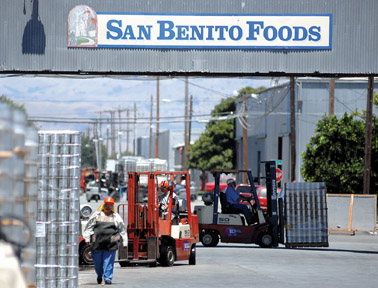
San Benito Foods to employ hundreds during canning season
The San Benito Foods tomato cannery was gearing up this week for
another canning season, which each year employs hundreds of
seasonal workers.
The San Benito Foods cannery, the last remaining one in the
county, runs its canning season for around 10 to 12 weeks each
summer, usually sometime after July 4. This year’s canning season
is starting at around the same time as last year’s did.
San Benito Foods to employ hundreds during canning season
The San Benito Foods tomato cannery was gearing up this week for another canning season, which each year employs hundreds of seasonal workers.
The San Benito Foods cannery, the last remaining one in the county, runs its canning season for around 10 to 12 weeks each summer, usually sometime after July 4. This year’s canning season is starting at around the same time as last year’s did.
During that time, San Benito Foods adds hundreds of seasonal jobs to the local economy, while city crews operate an industrial wastewater plant in the summer – neighboring San Juan Hollister Road near the new sewer facility – designated just for the cannery. San Benito Foods reimburses Hollister for all the related expenses.
Agriculture Commissioner Ron Ross noted San Benito Foods starts using tomatoes from the Central Valley – because they are ready earlier – and finishes using the local ones, usually around September.
Ross said in 2009 there was a “record year” for tomato production in the area because many producers moved to this county, with the vast uncertainty of water supply in the neighboring region.
Ross said the acreage is down slightly this year but there still is a lot of production.
It appears as though San Benito Foods has been doing well for the past couple of years. Total values listed in the latest crop report, released this week, showed that the tomato canning industry in the county jumped from having a value of $4.65 million in 2008 to $17.841 million in 2009. Production increased from 1,384 acres to 3,906.
That followed a major increase from the prior year as well.
Canning values had risen from $3.4 million in 2007 to $4.65 million in 2008, according to crop report figures. The cannery’s plant manager could not be reached before press time.









